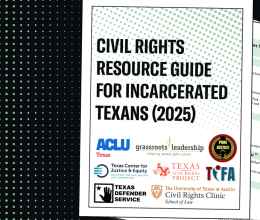
By Elizabeth Pierson The Brownsville Herald
AUSTIN - Elected officials are vowing to investigate a sharp increase of abuses confirmed in Texas' juvenile prison system.
"We certainly have been monitoring it at the governor's level and it is a concern, just as an increase in violence in the adult prison system would be a concern," said Kathy Walt, spokeswoman for Gov. Rick Perry.
Perry hopes the $993,000 the Legislature appropriated in 2005 to the Texas Youth Commission for its Professional Development Academy will help by training employees on how to diffuse difficult situations properly, Walt said.
Already the House and Senate committees that oversee the TYC are investigating abuse in the agency, in part because of a string of abuses at the Evins Regional Juvenile Center in Edinburg in late 2004.
An investigation by Valley Freedom Newspapers found the abuses were part of a larger trend. Physical abuse rates agency-wide doubled in 2004.
By 2005, three of every 100 youth were being physically abused, records show. Training may be just one part of the solution, said Rep. Harold Dutton, D-Houston, chairman of the House Committee on Juvenile Justice and Family Issues.
"Turnover probably plays a part in it. Staff salaries probably pay a part," Dutton said. "But I think the real issue is whether state officials can commit themselves to eradicating any form of abuse that is oc-curring in TYC facilities."
State Sen. Juan "Chuy" Hinojosa, D-McAllen, said the findings did not surprise him because he re-ceived numerous calls from parents around the state reporting violence in TYC after the Evins abuses came to light last year. Hinojosa is a member of the Senate Committee on Criminal Justice.
"It's disturbing," he said of the abuse. "And we need to review and make whatever changes that are ap-propriate to make the system work the way it's supposed to work."
Most troubling to Hinojosa is the agency's ability to add time to youths' sentences. Longer sentences imposed subjectively give youth a sense of hopelessness and contribute to violence, he said.
More than 90 percent of children committed to TYC have so-called "indeterminate" sentences, which means there is no specific date on which they will be released.
TYC policy determines when they are released based on their progress in behavioral, therapy and aca-demic programs. Administrators can add time to their sentence for bad behavior without court approval.
State Rep. Aaron Peña said he his concerned with staff-to-youth ratios that don't always seem to favor staff members.
Peña, D-Edinburg, is a member of the House Appropriations and Criminal Jurisprudence committees.
"I realize that there are legitimate concerns about the way that we're treating people at these facilities and I hear the concerns also of the guards and the other people who are working there."
Peña said he thinks legislative cuts to the agency in 2003 contributed to staffing shortages and, indi-rectly, to abuse.
In Fiscal Year 2001, the agency had a budget of $260 million. By 2004, it had dropped to $238 million.
Dwight Harris, executive director of TYC, said cuts in 2003 did not directly affect staffing of juvenile correctional officers, who most often abuse youth.
"We had some very serious deductions in some of our key areas, but not in our JCO ranks, per se," Harris said. "If anything, the issue has now become better compensation for these JCO officers so that we can compete, and retain these staff."
Posted on Mar 20, 06 | 12:00 am






